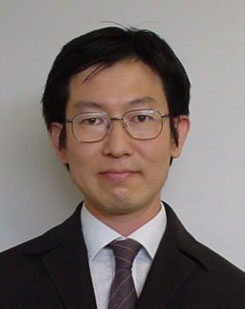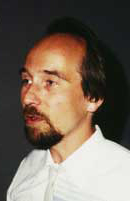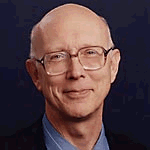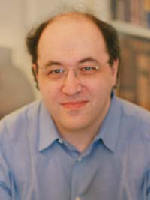|
Home
Call for Papers
Workshops
Program
Program Committee
Keynote Speakers
Submissions
Registration
Lodging
Travel
Sponsors


 Artwork
by Dr. Cliff Pickover used by permission
Artwork
by Dr. Cliff Pickover used by permission |
|
Keynote Speakers
 Satoshi Murata is an associate
professor with the Autonomous Decentralized Control Group at
Tokyo Institute of Technology. He is pioneering self-reconfigurable
robots which are able to assemble
and repair themselves. He and his colleagues in AIST (National
Institute of Advanced Industrial Science and Technology) have
developed and demonstrated several generations of modular self-reconfigurable
robots (movies: rm
6.6MB, mpeg
24.9MB,) based on their theories of self-organization among
many homogeneous agents. (Modular
Transformer web site) Satoshi Murata is an associate
professor with the Autonomous Decentralized Control Group at
Tokyo Institute of Technology. He is pioneering self-reconfigurable
robots which are able to assemble
and repair themselves. He and his colleagues in AIST (National
Institute of Advanced Industrial Science and Technology) have
developed and demonstrated several generations of modular self-reconfigurable
robots (movies: rm
6.6MB, mpeg
24.9MB,) based on their theories of self-organization among
many homogeneous agents. (Modular
Transformer web site)
 Eors
Szathmary is a permanent Fellow of the Institute for
Advanced Study in Budapest (Hungary) and director of the Plant Taxonomy
and Ecology Department of the University of Budapest. His
main work has focused on understanding the fundamental principles
underlying the increase of complexity in the biological world.
He has published two important books (The Major Transitions in
Evolution, Freeman, 1995, and The Origins of Life, Oxford University
Press, 1999), as well as papers in Nature, Science, Proceedings
of the National Academy of Sciences of the USA, and Journal of
Theoretical Biology. Eors
Szathmary is a permanent Fellow of the Institute for
Advanced Study in Budapest (Hungary) and director of the Plant Taxonomy
and Ecology Department of the University of Budapest. His
main work has focused on understanding the fundamental principles
underlying the increase of complexity in the biological world.
He has published two important books (The Major Transitions in
Evolution, Freeman, 1995, and The Origins of Life, Oxford University
Press, 1999), as well as papers in Nature, Science, Proceedings
of the National Academy of Sciences of the USA, and Journal of
Theoretical Biology.
 George M Whitesides is
considered the father
of nanotechnology and physical self-assembly, and his papers
have been cited over 10,000 times. The Mallinckrodt Professor
of Chemistry at Harvard
University, Dr. Whitesides is recipient of innumerable honors
including Fellow of the American Association for the Advancement
of Science, the National Medal of Science, the Von Hippel award
in Material Sciences, and the Kyoto Prize. George M Whitesides is
considered the father
of nanotechnology and physical self-assembly, and his papers
have been cited over 10,000 times. The Mallinckrodt Professor
of Chemistry at Harvard
University, Dr. Whitesides is recipient of innumerable honors
including Fellow of the American Association for the Advancement
of Science, the National Medal of Science, the Von Hippel award
in Material Sciences, and the Kyoto Prize.
 Stephen Wolfram was educated
at Eton, Oxford, and Caltech, receiving his Ph.D. in theoretical
physics in 1979 at the age of 20. His early work in physics and
computer science was recognized by a MacArthur
fellowship in 1981, and his discoveries about Cellular Automata
and Complexity were foundational to the field of Artificial Life.
In 1986 he founded Wolfram
Research and created Mathematica.
His recent book, A New
Kind of Science became a bestseller in 2002. Stephen Wolfram was educated
at Eton, Oxford, and Caltech, receiving his Ph.D. in theoretical
physics in 1979 at the age of 20. His early work in physics and
computer science was recognized by a MacArthur
fellowship in 1981, and his discoveries about Cellular Automata
and Complexity were foundational to the field of Artificial Life.
In 1986 he founded Wolfram
Research and created Mathematica.
His recent book, A New
Kind of Science became a bestseller in 2002.
|